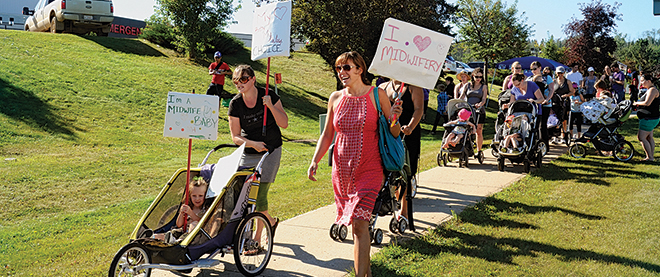Health-care system taxed during Fort McMurray’s baby boom
A boomtown with only 3 obstetricians and no midwives
Mike Tosio
Share

Every six hours, a baby is born in Fort McMurray, Alta. This might be a great sign for the young oil town, where the median age is 31, as couples feel they have enough economic stability to start a family. It is not good news, however, for the many soon-to-be mothers expecting wait times upwards of seven hours at the hospital because Fort McMurray has only three obstetrician-gynecologists.
“They have to fly obstericians in from other cities very often because they don’t have enough in Fort McMurray to cover the 24-7 on-call,” says Lucie Lapierre, a local registered nurse. The city’s only hospital is decades old and simply too small to provide enough beds for the maternity ward, according to Lapierre. “You often have to get beds in surgery or other departments.” As a result, it is not uncommon for expectant mothers living in Fort McMurray to travel the 441 km to Edmonton, or even their home province, to give birth, though there are no statistics to keep track of this trend.
What can be tracked is the baby boom in the oil-rich north. In January 2012, there was a single-month record of 118 babies born at the Northern Lights Regional Health Centre. A new record was set again that May with 131 babies, only to be swiftly broken in July with 147 newborns.
“It’s like a competition to outdo ourselves,” says Jon Tupper, former president of the Fort McMurray Chamber of Commerce. Over a three-year period, the city had a birth rate of 34.7 per 1,000 population, according to a 2013 Alberta Health report, a rate much higher than the provincial average of 27.4 per thousand. In an effort to get more funding for family and pediactric care, Tupper recently ran for city council with a promise to lobby the provincial government for “birthing centres,” but was unsuccessful in his bid to win a seat.
Also unsuccessful has been Fort McMurray’s attempts to find a single registered midwife to practise anywhere in Wood Buffalo—the northeastern Alberta regional municipality that encompasses Fort Mac. With a lack of options for women wanting a non-hospital birth, Lapierre organized a local “Where’s my midwife?” rally this fall. A three-year agreement signed this April between Alberta Health Services and the Alberta Association of Midwives promised $37 million to midwives, but that isn’t enough to satisfy demand for the entire province, according to Lapierre, and it will prevent Fort McMurray from getting any midwives until a new contract is signed.
This isn’t great news for Erin Sloan, who was born and raised in Fort McMurray and graduated from the midwifery program at Laurentian University this spring. She hoped to practise in Alberta, but without enough funding for new midwives, opted to start her career in Kelowna, B.C. “I would love to serve the people of Fort McMurray,” Sloan says. “The hospital is overwhelmed. The doctors are overwhelmed.” The 23-year-old remains hopeful that she can one day open up her own practice in her hometown, if there is enough financial backing from the province. “If we don’t get more funding, I won’t go back,” she says.